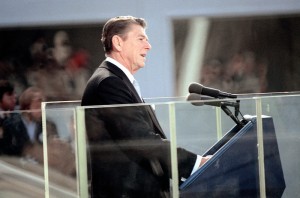Source: Consortium News
U.S. government officials are in high dudgeon again -- this time over Iran's audacity in naming an ambassador to the United Nations who allegedly played a minor role in the 1979-81 crisis in which 52 Americans were held hostage for 444 days in Iran. But the same U.S. officials ignore the now overwhelming evidence that Ronald Reagan and George H.W. Bush helped extend the hostages' suffering to gain an edge in the 1980 election.
The double standard -- getting worked up over the allegations about Iranian Ambassador Hamid Aboutalebi and going silent over the evidence implicating Reagan and Bush -- is just the latest in a long series of examples of the U.S. government's hypocrisy.
It is rare for the United States to block an ambassador to the United Nations, which is located in New York City, but Aboutalebi's selection has become the latest excuse for congressional hardliners to throw a wrench into negotiations aimed at limiting but not eliminating Iran's nuclear program. On Monday, the U.S. Senate passed a bill sponsored by Sen. Ted Cruz, R-Texas, to deny Aboutalebi a visa for entering the United States. Following the Senate's lead, the Obama administration also has criticized the nomination.
The irony, however, is that Cruz and pretty much every leading Republican model themselves after President Reagan whose election in 1980 now appears to have been aided by his campaign's behind-the-scenes maneuvering to frustrate President Jimmy Carter's negotiations to gain the hostages' freedom. Those talks broke down in October 1980 and the hostages were only freed after Reagan was inaugurated on Jan. 20, 1981.
Reagan's purported "October Surprise" operation to torpedo Carter's hoped-for success in getting the hostages out before the Nov. 4, 1980, election would have made the Republican icon a much bigger villain in the hostages' ordeal than Aboutalebi. George H.W. Bush, who was Reagan's running mate in 1980, was also implicated in the sabotage operation.
Mounting Evidence
The evidence of this Republican skullduggery has been building for more than three decades, with the 1980 contacts between the Reagan team and radical Iranians appearing to be the opening chapter of the Iran-Contra saga of 1985-86, which also involved secret contacts and the trading of arms for hostages.
Both operations also were shielded by aggressive Republican cover-ups that extended from 1986 to 1993, although congressional and government investigators did a much better job in excavating the Iran-Contra secrets than they did with the October Surprise case. It wasn't until last June that Rep. Lee Hamilton, D-Indiana, who headed both congressional inquiries, admitted that he had been misled about key October Surprise evidence.
In a phone interview, the retired Indiana Democrat responded to a document that I had e-mailed him revealing that in 1991 a deputy White House counsel working for then-President George H.W. Bush was notified by the State Department that Reagan's campaign director William Casey had taken a trip to Madrid in relation to the so-called October Surprise issue.
Casey's alleged trip to Madrid in 1980 had been at the center of Hamilton's investigation in 1991-92 into whether Reagan's campaign went behind Carter's back to frustrate his hostage negotiations. In early 1993, Hamilton's task force dismissed the allegations after concluding that Casey had not traveled to Madrid.
"We found no evidence to confirm Casey's trip to Madrid," Hamilton told me. "We couldn't show that. ... The [Bush-41] White House did not notify us that he did make the trip. Should they have passed that on to us? They should have because they knew we were interested in that."
Asked if knowledge that Casey had traveled to Madrid might have changed the task force's dismissive October Surprise conclusion, Hamilton said yes, because the question of the Madrid trip was key to the task force's investigation. "If the White House knew that Casey was there, they certainly should have shared it with us," Hamilton said, adding that "you have to rely on people" in authority to comply with information requests.
The document revealing White House knowledge of Casey's Madrid trip was among records released to me by the archivists at the George H.W. Bush library in College Station, Texas. The U.S. Embassy's confirmation of Casey's trip was passed along by State Department legal adviser Edwin D. Williamson to Associate White House Counsel Chester Paul Beach Jr. in early November 1991, just as the October Surprise inquiry was taking shape.
Williamson said that among the State Department "material potentially relevant to the October Surprise allegations [was] a cable from the Madrid embassy indicating that Bill Casey was in town, for purposes unknown," Beach noted in a "memorandum for record" dated Nov. 4, 1991.
Organizing the Cover-up
Two days later, on Nov. 6, Beach's boss, White House counsel C. Boyden Gray, arranged an inter-agency strategy session and explained the need to contain the congressional investigation into the October Surprise case. The explicit goal was to insure the scandal would not hurt President Bush's reelection hopes in 1992.
(Note: You can view every article as one long page if you sign up as an Advocate Member, or higher).






